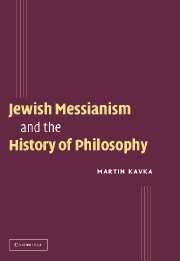Book contents
- Frontmatter
- Contents
- Acknowledgments
- List of Abbreviations
- Introduction: From Athens to Jerusalem
- 1 The Meontological Conundrum: Emmanuel Levinas and Emil Fackenheim on the Athens–Jerusalem Conflict
- 2 Beyond “Beyond Being”: Nonbeing in Plato and Husserl
- 3 Nonbeing as Not-Yet-Being: Meontology in Maimonides and Hermann Cohen
- 4 Nonbeing Ensouled, Nonbeing Embodied: Levinas versus Rosenzweig on the Role of the Other in Messianic Anticipation
- Conclusion: Deepening the Roots of the Jewish Meontological Tradition, or contra the Derridean “Messianic”
- Works Cited
- Index
Introduction: From Athens to Jerusalem
Published online by Cambridge University Press: 09 July 2009
- Frontmatter
- Contents
- Acknowledgments
- List of Abbreviations
- Introduction: From Athens to Jerusalem
- 1 The Meontological Conundrum: Emmanuel Levinas and Emil Fackenheim on the Athens–Jerusalem Conflict
- 2 Beyond “Beyond Being”: Nonbeing in Plato and Husserl
- 3 Nonbeing as Not-Yet-Being: Meontology in Maimonides and Hermann Cohen
- 4 Nonbeing Ensouled, Nonbeing Embodied: Levinas versus Rosenzweig on the Role of the Other in Messianic Anticipation
- Conclusion: Deepening the Roots of the Jewish Meontological Tradition, or contra the Derridean “Messianic”
- Works Cited
- Index
Summary
D—— and others,
I write you anxious that these words will not be able to sustain our conversation.
After all, this is a book about meontology, literally the study of that which is not, of nonbeing (in Greek, to mē on). “Meontology” is not exactly a word that is on the tips of people's tongues at the moment. It perhaps only calls attention to its own obscurity, evidence for yet another scholar's ignorance of the real world, of body, of skin. If so, then our conversation will fall into nothingness – an event I cannot bear to face. In resistance against this possibility, I want to state, at the outset, as simply as possible, what is at stake in thinking about meontology, so that I can hear or read your response, which I so fervently desire. I imagine you (perhaps falsely) asking four questions about what I will describe in these pages as “the Jewish meontological tradition,” and I offer four preliminary responses.
What is not? Everything that has not yet actualized its potential. Most viscerally, me.
What is meontology? The study of unmediated experiences of lack and privation. This study inaugurates self-critique and the realization that I live in a moment best described as not-yet. I thereby begin my path toward human perfection and toward God.
How do I live in this not-yet? In manic desire for what appears to me to be stable, for what displays a comfort in its own skin that I have never experienced. For you.
- Type
- Chapter
- Information
- Jewish Messianism and the History of Philosophy , pp. 1 - 17Publisher: Cambridge University PressPrint publication year: 2004



